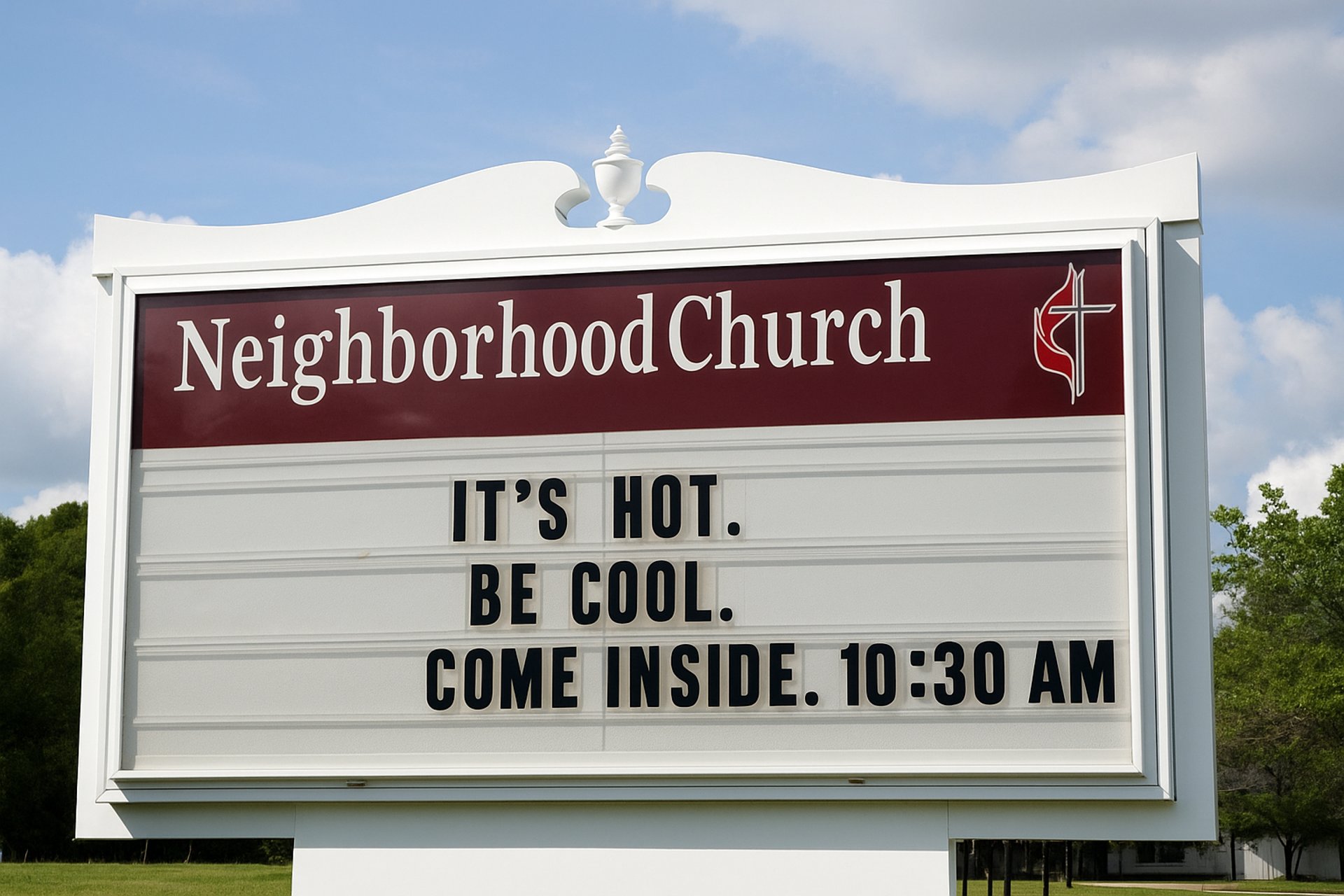
Sunday is for Everyone
A candid reflection on a Father’s Day church experience that explores the importance of inclusive, Scripture-based sermons. Why every Sunday message should speak to the whole congregation—not just one group.
CHURCH
7/18/20253 min read


We settled into our seats in the tiny, neighborhood church with the meme-worthy sign out front. That day, it read, “It’s hot. Be cool. Come inside. 10:30 AM.” My dad had attended a few times, and for Father’s Day, he wanted his two local daughters to join him. Of course, we obliged.
I braced myself for an awkward greeting, a simple worship set, and a warm, personal message.
The greetings were pleasant, and one gentleman looked at my sister and me with a twinkle in his eye as he said, “I do hope you’ll come back and make this church your home.” Naturally, as the young blood in the room, they were eager to keep us around.
The worship was simple and sweet, a little off-key at times, but surely beautiful to the Father’s ears.
The sermon, however, gave me pause. Was it personal? Sure. But it wasn’t encouraging, grounded, or theologically strong. It narrowly focused on one group in the room and left little for anyone else.
It should be noted that I’m a critic and skeptic by nature. But often, my criticism comes from deep care, especially when it involves Scripture or the Church.
I didn’t grow up in tiny chapel-style churches, but I’ve grown to love them. The health of a church isn’t measured in size—it’s measured in fruit.
Sunday Is for Everyone
Each year, a few holidays tempt churches to focus only on certain groups. Father’s Day is one of them. And this sweet, friendly church fell into that trap.
The pastor said “you, fathers” nearly every other sentence. He made it clear early on that the message was only for dads. He didn’t acknowledge the grief or longing of those who wanted to be fathers, or the pain of those carrying wounds from their own.
To be clear: we should celebrate dads! Our culture rarely honors them. But sermons should never alienate half the congregation. Sunday is for everyone.
Often, even targeted holiday messages circle back to how God parents us (you know, God is our Father when our earthly fathers have failed us)—but not this one. This was more admonishment than encouragement. And while the pastor’s intentions were good, the message was built entirely on what earthly fathers must do, with no Scriptural depth to support or guide it.
While I was immediately discouraged to hear the direction of the sermon, I decided to listen on behalf of my dad and the dads I knew, to carry this message for them. What started as a bummed but willing-to-listen mentality quickly turned into deep frustration with how careless the pastor was being with the Word of God.
The Weight of the Pulpit
He opened with Micah 6:8: “Do justice, love kindness, walk humbly with your God.” Then… he moved on. No context, no explanation. Just a call for fathers to “do better.”
He referenced other Scriptures without citing them. At one point, he quoted, “As for me and my house…” and couldn’t remember which book it came from—so he asked the crowd (not in an interactive kind of way), who replied promptly, "Joshua".
This pastor might be a wonderful shepherd who cares deeply for his people. But on this Sunday, he wasn’t functioning as a teacher. Shepherding is vital—something large churches sometimes lack. But it can’t replace the need to teach and rightly handle the Word of God.
Pastors Are Called to More
Scripture is clear: the church is meant for teaching, growth, and mutual encouragement in Christ. It’s not just about potlucks and community—it’s about knowing God more deeply. That requires pastors who pore over the Word and lead others to do the same.
“Let the message of Christ dwell among you richly as you teach and admonish one another…” (Colossians 3:16) “...that the church may be built up.” (1 Corinthians 14:26)
When pastors dedicate the entire sermon to one group, they miss the chance to build up the whole church. And they risk wounding those silently grieving—those who lost fathers, those hurt by them, or those who lost children of their own.
Many churches have grown to understand this tension on Mother’s Day. The same should be true for Father’s Day. If you’re going to teach on fatherhood, don’t ignore the reality of father wounds or the beauty of spiritual fatherhood.
Most importantly, Scripture must be the foundation of any message.
“He must hold firmly to the trustworthy message... so that he can encourage others by sound doctrine and refute those who oppose it.” (Titus 1:9)
That doesn’t mean every pastor needs to be a world-class speaker. But it does mean they should be deeply rooted in the Word and careful with their teaching. The Spirit fills in human gaps, but carelessness in the pulpit invites confusion and disconnection.
Maybe this was just an off day. We’ve all had them. I pray that’s the case—and that future Sundays bring deeper, richer teaching to everyone who walks through those doors.
Get the Truth Balm Newsletter for weekly word studies from the Bible and monthly content to inspire you to live a holistic faith.
2023 ⓒ All Rights Reserved. Stephanie LaPreal Creative